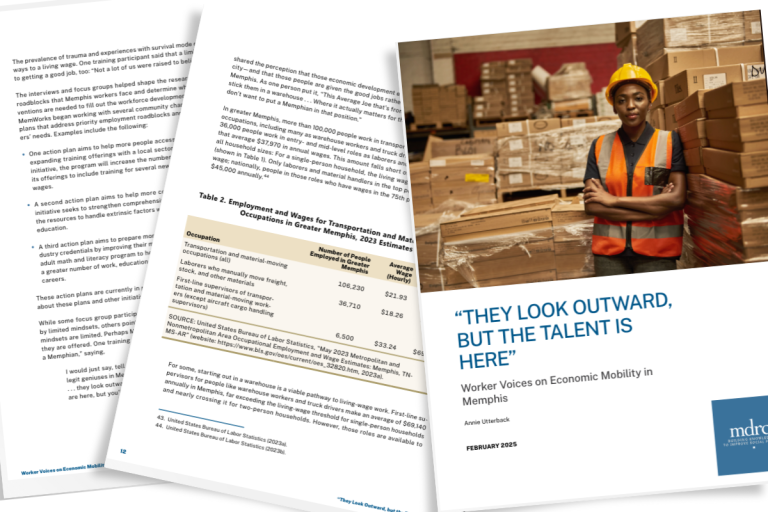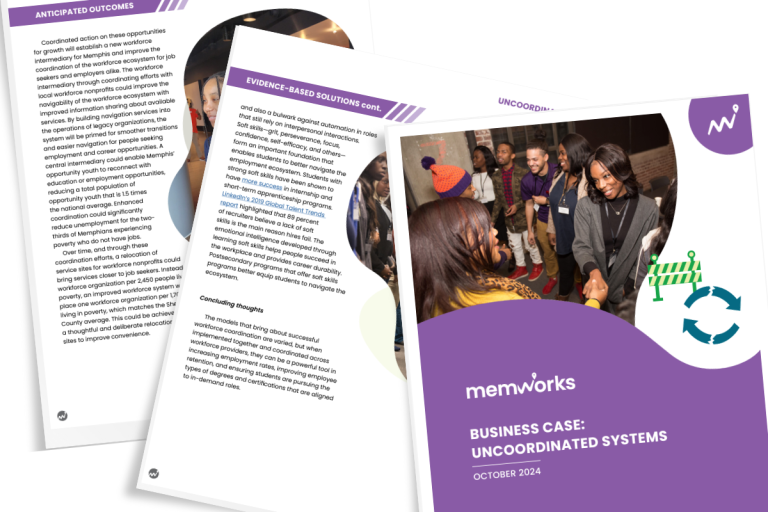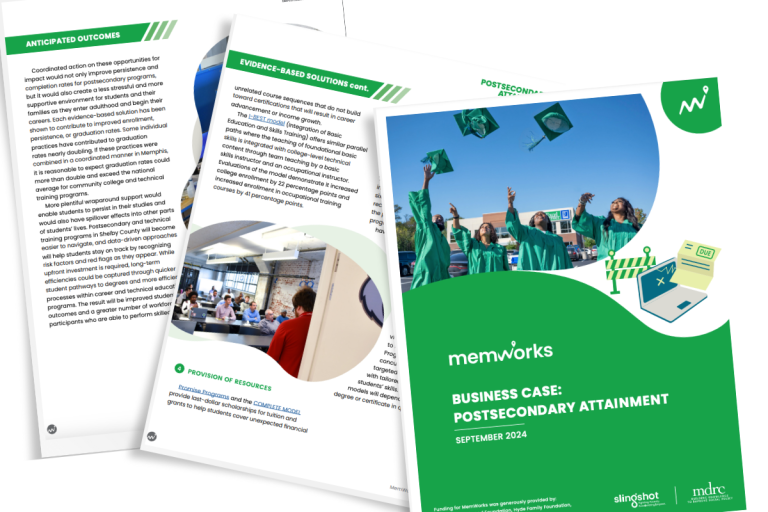MemWorks built a comprehensive understanding of the challenges faced by workforce participants living in poverty before developing evidence-based solutions to address them. Meeting with workforce participants, and the organizations that support them, to understand their experience pursuing postsecondary education and seeking living-wage career paths was a core focus of MemWorks. We conducted surveys, interviews, and focus groups with more than 100 postsecondary students, workforce participants, employers, and nonprofit staff who provide workforce services.
This blog post shares insights from these conversations about how living in poverty can create a sense of survival mode, where a person is forced to focus nearly all of their efforts to help them and their family subsist and tackle the immediate roadblocks in their path. When operating in survival mode, it is almost impossible to make and pursue long-term plans like setting goals to pursue a living-wage career path.
Survival mode is all consuming.
“When you’re in survival mode, you can’t think about nothing else but making it day-to-day.”
– American Jobs Center Participant
Survival mode is the feeling that comes when a person faces a dire need that they must immediately address. This could include not having money to purchase food, falling short on rent and facing eviction, or struggling to find childcare for their children while they are at work. When in survival mode people do whatever they can to overcome the challenge at hand. They simply lack the time to focus on anything but fulfilling their dire need. When people consistently operate in survival mode, it can be incredibly difficult to leave that mindset even when there is an opportunity.
It can be nearly impossible to break out of survival mode.
“It’s like entrapment, but it’s like, what did I do to become trapped?…Like what did I do? What did I personally do that I can’t advance myself in this way?”
– Technical Training Participant
We met with job seekers who found themselves stuck in survival mode. They professed a genuine desire to break out of survival mode and focus on long-term goals like finding a living-wage career path. It can be incredibly difficult because of the trauma they’ve been exposed to and the frequent need to act to keep themselves and their families afloat.
Mental health support could help people break out of survival mode, but many Memphians lack access to mental health services and substance abuse support because of prohibitive costs, lack of proximity to available resources, or limited awareness of resources. Without access to professional help, survival mode frequently persists due to the effects untreated trauma has in adulthood and the severe challenges faced by Memphians living in poverty.
Transportation and childcare are frequent triggers of survival mode.
“I had to depend on people for rides and they really didn’t wanna give me no rides or they’ll charge me money for rides. I didn’t have a job at the time or I didn’t have no money, so I’ll be left stranded and I have to walk to places. Once I bought my bike, I would ride my bike to places, then I got hit by a truck and that ended. So I just gave up on everything and just stick to walking and ask my mom for a ride everywhere.”
– Technical Training Alum
Transportation was one of the most readily named barriers, with Memphians concerned with limited bus routes and hours. Several Memphians without reliable private transportation mentioned commuting to work or training via Uber, even if this option is expensive.
On top of transportation challenges, childcare presented as a barrier, especially for people without support from extended family members. Some nonprofits and training programs offer childcare or referrals to childcare support, but frequently available childcare support is located many miles away from a person’s workplace or training program.
Memphians struggle to access services to help with career planning.
“I was working with Sonic, Walmart, Target, and then like barbecue restaurants. I was working tons of different jobs. And I would do it, for maybe a good month or two, but then once that second month hit, I would get so drained and bored.”
– Technical Training Alum
Lacking formal career exploration or exposure, many Memphians described cycling through many different industries, changing jobs frequently, and earning multiple unrelated certifications in a process of finding something that stuck. Memphians described taking jobs that were most accessible or readily available. This is a persistent feature of survival mode, as the urgency to obtain any income overshadows the ability to work toward a living-wage career.
With more comprehensive career guidance from the workforce system, Memphians living in poverty would be empowered to break the survival mode trap and pursue long-term goal setting that could enable the training and preparation necessary to pursue living-wage careers. This, in turn, could help families break the cycle of poverty.





